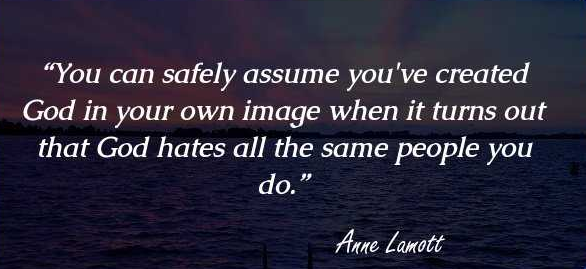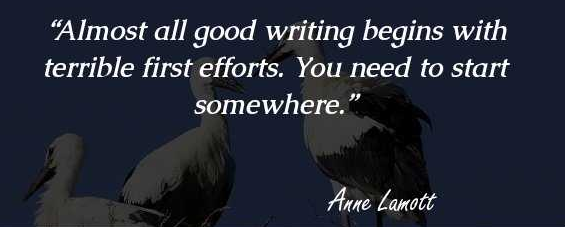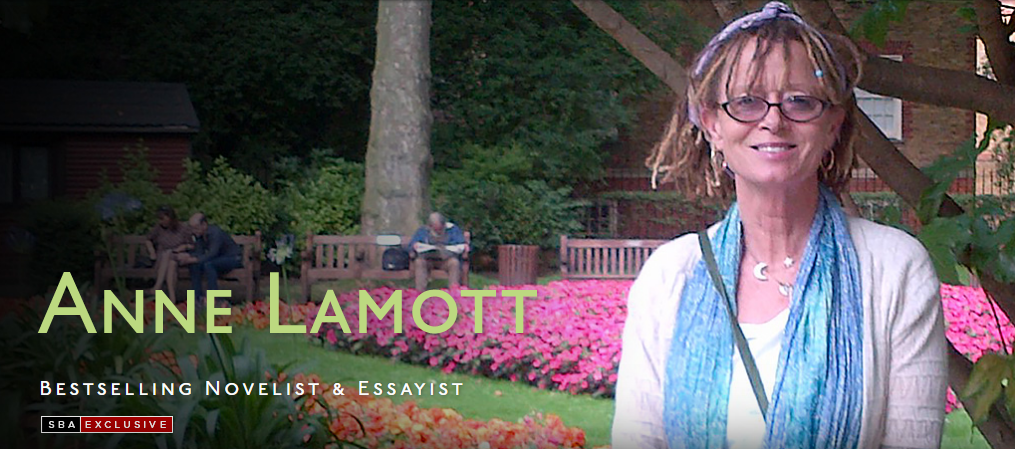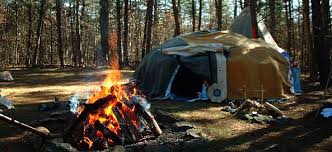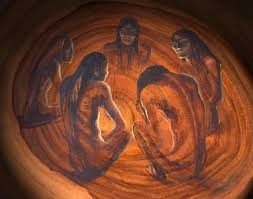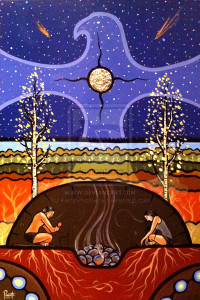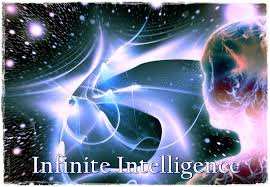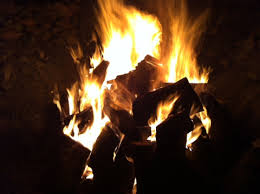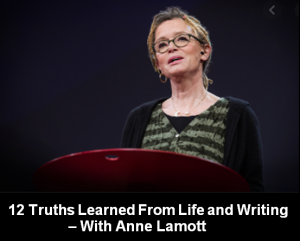 If you’ve been around writing—and life—for a while, you’ll know of Anne Lamott. Anne’s the “Shitty First Draft” gal and “Bird by Bird” guru who says more in a phrase than most writers spew in a book. Anne Lamott addresses life’s capital-letter subjects. Alcoholism. Motherhood. Cancer. Community. Alternate Lifestyles. Listening. Faith. Depression. Sobriety. Desperation. Storytelling. Work. Politics. Jesus, Christianity and God. Anne’s also laugh-out-loud funny, and she’s brutally truthful.
If you’ve been around writing—and life—for a while, you’ll know of Anne Lamott. Anne’s the “Shitty First Draft” gal and “Bird by Bird” guru who says more in a phrase than most writers spew in a book. Anne Lamott addresses life’s capital-letter subjects. Alcoholism. Motherhood. Cancer. Community. Alternate Lifestyles. Listening. Faith. Depression. Sobriety. Desperation. Storytelling. Work. Politics. Jesus, Christianity and God. Anne’s also laugh-out-loud funny, and she’s brutally truthful.
Anne Lamott is a Guggenheim Fellow, a U of C prof, a highly-sought lecturer, a Hall of Fame Californian and the multi-time bestseller of fiction and non-fiction alike. To quote Anne, “I write books I’d love to come upon. Ones that are honest, concerned with real lives, spiritual transformation, families, secrets, craziness – and make me laugh.”
And, there’s the progressive social activist side to Anne Lamott. She’s a polished public speaker with a viral TED Talk. With kind permission, here’s Anne’s TED video and transcript.
“My seven-year-old grandson sleeps just down the hall from me, and he wakes up a lot of mornings and he says, “You know, this could be the best day ever.” And other times, in the middle of the night, he calls out in a tremulous voice, “Nana, will you ever get sick and die?”
I think this pretty much says it for me and for most of the people I know, that we’re a mixed grill of happy anticipation and dread. So I sat down a few days before my 61st birthday, and I decided to compile a list of everything I know for sure. There’s so little truth in the popular culture, and it’s good to be sure of a few things.
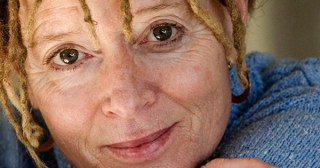 For instance, I am no longer 47, although this is the age I feel, and the age I like to think of myself as being. My friend Paul used to say in his late 70s that he felt like a young man with something really wrong with him.
For instance, I am no longer 47, although this is the age I feel, and the age I like to think of myself as being. My friend Paul used to say in his late 70s that he felt like a young man with something really wrong with him.
Our true person is outside of time and space, but looking at the paperwork, I can, in fact, see that I was born in 1954. My inside self is outside of time and space. It doesn’t have an age. I’m every age I’ve ever been, and so are you, although I can’t help mentioning as an aside that it might have been helpful if I hadn’t followed the skin care rules of the ’60s, which involved getting as much sun as possible while slathered in baby oil and basking in the glow of a tinfoil reflector shield.
It was so liberating, though, to face the truth that I was no longer in the last throes of middle age, that I decided to write down every single true thing I know. People feel really doomed and overwhelmed these days, and they keep asking me what’s true. So I hope that my list of things I’m almost positive about might offer some basic operating instructions to anyone who is feeling really overwhelmed or beleaguered.
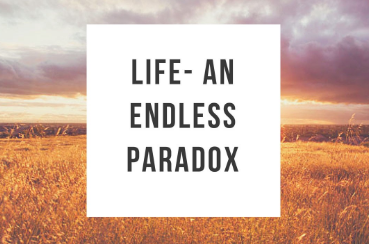 Number one: The first and truest thing is that all truth is a paradox. Life is both a precious, unfathomably beautiful gift, and it’s impossible here, on the incarnational side of things. It’s been a very bad match for those of us who were born extremely sensitive. It’s so hard and weird that we sometimes wonder if we’re being punked. It’s filled simultaneously with heartbreaking sweetness and beauty, desperate poverty, floods and babies and acne and Mozart, all swirled together. I don’t think it’s an ideal system.
Number one: The first and truest thing is that all truth is a paradox. Life is both a precious, unfathomably beautiful gift, and it’s impossible here, on the incarnational side of things. It’s been a very bad match for those of us who were born extremely sensitive. It’s so hard and weird that we sometimes wonder if we’re being punked. It’s filled simultaneously with heartbreaking sweetness and beauty, desperate poverty, floods and babies and acne and Mozart, all swirled together. I don’t think it’s an ideal system.
Number two: Almost everything will work again if you unplug it for a few minutes — including you.
Three: There is almost nothing outside of you that will help in any kind of lasting way, unless you’re waiting for an organ. You can’t buy, achieve or date serenity and peace of mind. This is the most horrible truth, and I so resent it. But it’s an inside job, and we can’t arrange peace or lasting improvement for the people we love most in the world. They have to find their own ways, their own answers. You can’t run alongside your grown children with sunscreen and ChapStick on their hero’s journey. You have to release them. It’s disrespectful not to. And if it’s someone else’s problem, you probably don’t have the answer, anyway.
Our help is usually not very helpful. Our help is often toxic. And help is the sunny side of control. Stop helping so much. Don’t get your help and goodness all over everybody.
This brings us to number four: Everyone is screwed up, broken, clingy and scared, even the people who seem to have it most together. They are much more like you than you would believe, so try not to compare your insides to other people’s outsides. It will only make you worse than you already are.
Also, you can’t save, fix or rescue any of them or get anyone sober. What helped me get clean and sober 30 years ago was the catastrophe of my behavior and thinking. So I asked some sober friends for help, and I turned to a higher power. One acronym for God is the “gift of desperation,” G-O-D, or as a sober friend put it, by the end I was deteriorating faster than I could lower my standards.
So God might mean, in this case, “me running out of any more good ideas.”
While fixing and saving and trying to rescue is futile, radical self-care is quantum, and it radiates out from you into the atmosphere like a little fresh air. It’s a huge gift to the world. When people respond by saying, “Well, isn’t she full of herself,” just smile obliquely like Mona Lisa and make both of you a nice cup of tea. Being full of affection for one’s goofy, self-centered, cranky, annoying self is home. It’s where world peace begins.
Number five: Chocolate with 75 percent cacao is not actually a food. Its best use is as a bait in snake traps or to balance the legs of wobbly chairs. It was never meant to be considered an edible.
Number six: Writing. Every writer you know writes really terrible first drafts, but they keep their butt in the chair. That’s the secret of life. That’s probably the main difference between you and them. They just do it. They do it by prearrangement with themselves. They do it as a debt of honor. They tell stories that come through them one day at a time, little by little.
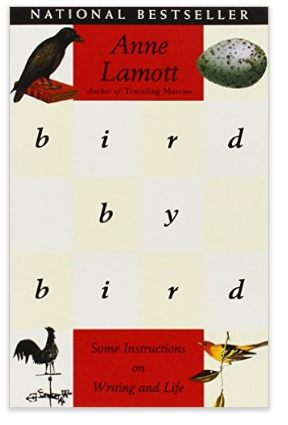 When my older brother was in fourth grade, he had a term paper on birds due the next day, and he hadn’t started. So my dad sat down with him with an Audubon book, paper, pencils and brads — for those of you who have gotten a little less young and remember brads — and he said to my brother, “Just take it bird by bird, buddy. Just read about pelicans and then write about pelicans in your own voice. And then find out about chickadees, and tell us about them in your own voice. And then geese.”
When my older brother was in fourth grade, he had a term paper on birds due the next day, and he hadn’t started. So my dad sat down with him with an Audubon book, paper, pencils and brads — for those of you who have gotten a little less young and remember brads — and he said to my brother, “Just take it bird by bird, buddy. Just read about pelicans and then write about pelicans in your own voice. And then find out about chickadees, and tell us about them in your own voice. And then geese.”
So the two most important things about writing are: bird by bird and really god-awful first drafts. If you don’t know where to start, remember that every single thing that happened to you is yours, and you get to tell it. If people wanted you to write more warmly about them, they should’ve behaved better.
You’re going to feel like hell if you wake up someday and you never wrote the stuff that is tugging on the sleeves of your heart: your stories, memories, visions and songs — your truth, your version of things — in your own voice. That’s really all you have to offer us, and that’s also why you were born.
Seven: Publication and temporary creative successes are something you have to recover from. They kill as many people as not. They will hurt, damage and change you in ways you cannot imagine. The most degraded and evil people I’ve ever known are male writers who’ve had huge best sellers. And yet, returning to number one, that all truth is paradox, it’s also a miracle to get your work published, to get your stories read and heard. Just try to bust yourself gently of the fantasy that publication will heal you, that it will fill the Swiss-cheesy holes inside of you. It can’t. It won’t. But writing can. So can singing in a choir or a bluegrass band. So can painting community murals or birding or fostering old dogs that no one else will.
Number eight: Families. Families are hard, hard, hard, no matter how cherished and astonishing they may also be. Again, see number one.
At family gatherings where you suddenly feel homicidal or suicidal –remember that in all cases, it’s a miracle that any of us, specifically, were conceived and born. Earth is forgiveness school. It begins with forgiving yourself, and then you might as well start at the dinner table. That way, you can do this work in comfortable pants.
When William Blake said that we are here to learn to endure the beams of love, he knew that your family would be an intimate part of this, even as you want to run screaming for your cute little life. But I promise you are up to it. You can do it, Cinderella, you can do it, and you will be amazed.
Nine: Food. Try to do a little better. I think you know what I mean.
Number ten: Grace. Grace is spiritual WD-40, or water wings. The mystery of grace is that God loves Henry Kissinger and Vladimir Putin and me exactly as much as He or She loves your new grandchild. Go figure.
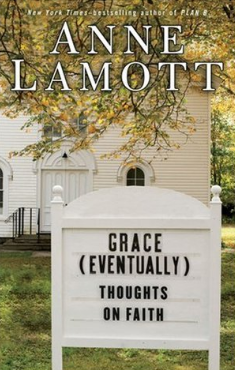 The movement of grace is what changes us, heals us and heals our world. To summon grace, say, “Help,” and then buckle up. Grace finds you exactly where you are, but it doesn’t leave you where it found you. And grace won’t look like Casper the Friendly Ghost, regrettably. But the phone will ring or the mail will come and then against all odds, you’ll get your sense of humor about yourself back. Laughter really is carbonated holiness. It helps us breathe again and again and gives us back to ourselves, and this gives us faith in life and each other. And remember — grace always bats last.
The movement of grace is what changes us, heals us and heals our world. To summon grace, say, “Help,” and then buckle up. Grace finds you exactly where you are, but it doesn’t leave you where it found you. And grace won’t look like Casper the Friendly Ghost, regrettably. But the phone will ring or the mail will come and then against all odds, you’ll get your sense of humor about yourself back. Laughter really is carbonated holiness. It helps us breathe again and again and gives us back to ourselves, and this gives us faith in life and each other. And remember — grace always bats last.
Eleven: God just means goodness. It’s really not all that scary. It means the divine or a loving, animating intelligence, or, as we learned from the great “Deteriorata,” “the cosmic muffin.” A good name for God is: “Not me.” Emerson said that the happiest person on Earth is the one who learns from nature the lessons of worship. So go outside a lot and look up. My pastor said you can trap bees on the bottom of mason jars without lids because they don’t look up, so they just walk around bitterly bumping into the glass walls. Go outside. Look up. Secret of life.
And finally: death. Number twelve. Wow and yikes. It’s so hard to bear when the few people you cannot live without die. You’ll never get over these losses, and no matter what the culture says, you’re not supposed to. We Christians like to think of death as a major change of address, but in any case, the person will live again fully in your heart if you don’t seal it off. Like Leonard Cohen said, “There are cracks in everything, and that’s how the light gets in.” And that’s how we feel our people again fully alive.
Also, the people will make you laugh out loud at the most inconvenient times, and that’s the great good news. But their absence will also be a lifelong nightmare of homesickness for you. Grief and friends, time and tears will heal you to some extent. Tears will bathe and baptize and hydrate and moisturize you and the ground on which you walk.
Do you know the first thing that God says to Moses? He says, “Take off your shoes.” Because this is holy ground, all evidence to the contrary. It’s hard to believe, but it’s the truest thing I know. When you’re a little bit older, like my tiny personal self, you realize that death is as sacred as birth. And don’t worry — get on with your life. Almost every single death is easy and gentle with the very best people surrounding you for as long as you need. You won’t be alone. They’ll help you cross over to whatever awaits us. As Ram Dass said, “When all is said and done, we’re really just all walking each other home.”
I think that’s it, but if I think of anything else, I’ll let you know. Thank you.
* * *
Anne Lamott’s Barclay Agency Biography:
Anne Lamott writes and speaks about subjects that begin with capital letters: Alcoholism, Motherhood, Jesus. But armed with self-effacing humor – she is laugh-out-loud funny – and ruthless honesty, Lamott converts her subjects into enchantment. Actually, she writes about what most of us don’t like to think about. She wrote her first novel for her father, the writer Kenneth Lamott, when he was diagnosed with brain cancer. She has said that the book was “a present to someone I loved who was going to die.”
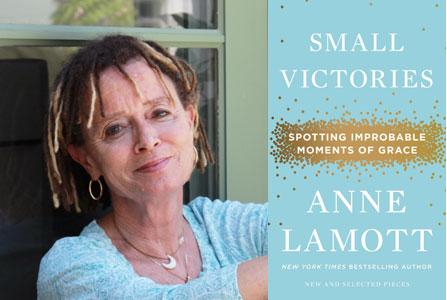 In all her novels, she writes about loss – loss of loved ones and loss of personal control. She doesn’t try to sugar-coat the sadness, frustration and disappointment, but tells her stories with honesty, compassion and a pureness of voice. As she says, “I have a lot of hope and a lot of faith and I struggle to communicate that.” Anne Lamott does communicate her faith; in her books and in person, she lifts, comforts, and inspires, all the while keeping us laughing.
In all her novels, she writes about loss – loss of loved ones and loss of personal control. She doesn’t try to sugar-coat the sadness, frustration and disappointment, but tells her stories with honesty, compassion and a pureness of voice. As she says, “I have a lot of hope and a lot of faith and I struggle to communicate that.” Anne Lamott does communicate her faith; in her books and in person, she lifts, comforts, and inspires, all the while keeping us laughing.
Anne Lamott is the author of seven novels, Hard Laughter, Rosie, Joe Jones, Blue Shoe, All New People, Crooked Little Heart, and Imperfect Birds. She has also written several bestselling books of nonfiction, including, Operating Instructions, an account of life as a single mother during her son’s first year; Some Assembly Required: A Journal of My Son’s First Son; and the classic book on writing; Bird by Bird: Some Instructions on Writing and Life. She has also authored several collections of autobiographical essays on faith; Traveling Mercies: Some Thoughts on Faith, Plan B: Further Thoughts on Faith, and Grace (Eventually): Thoughts on Faith. In addition, she has written, Help, Thanks, Wow: The Three Essential Prayers, Stitches; A Handbook on Meaning, Hope and Repair, Small Victories: Spotting Improbable Moments of Grace, and Hallelujah Anyway; Rediscovering Mercy. Her most recent book is Almost Everything: Notes on Hope (October 16, 2018, Riverhead Books).
Lamott has been honored with a Guggenheim Fellowship, and has taught at UC Davis, as well as at writing conferences across the country. Academy Award-winning filmmaker Freida Mock has made a documentary on Lamott, entitled “Bird by Bird with Annie” (1999). Anne Lamott has also been inducted into the California Hall of Fame.



